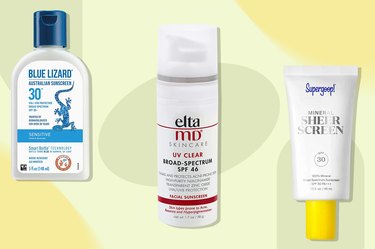
Your skin is the largest organ in your body. That means paying attention to your skin-care routine doesn't just affect your outer appearance — it's also helps safeguard your skin from inflammatory conditions (think: acne) and protect your skin from the sun's rays.
"The skin functions to help keep moisture in and keep irritants and pathogens out, so it is important to maintain the integrity of the skin barrier, which can be done with the proper use of skin-care products that are gentle on the skin barrier and help to nourish and support it," says Marisa Garshick, MD, a dermatologist at Medical Dermatology & Cosmetic Surgery in New York.
Video of the Day
Video of the Day
All that's to say that skin-care products are important to your skin health — but if you're overwhelmed by the volume of available options, that's understandable. To ease your search, keep these considerations in mind:
- Your skin type: This is a great starting point when you're choosing a product. For example, if your skin is oily, Dr. Garshick recommends ingredients like salicylic acid, which can be helpful to absorb excess oil, while if your skin is dry, she suggests ingredients that help moisturize the skin, like hyaluronic acid.
- Your skin-care concerns: "There may be different active ingredients to consider if you are trying to address certain skin-care concerns," Dr. Garshick says. That is, people with acne-prone skin will have different needs than those with dry skin, she says. "Those looking to help calm redness may not necessarily need an ingredient or product that helps with hyperpigmentation."
Tip
Of course, it's not unusual to have multiple skin-care concerns. You may, for instance, be eager to protect yourself from the sun, while also reducing breakouts. If you have several skin priorities, seek out an ingredient that can help address more than one issue, Dr. Garshick says. Introduce new ingredients one at a time to get a sense of benefits, she says.
Olay and Neutrogena are two very popular over-the-counter skin-care brands. Both offer many skin benefits. Depending on the type of product you're looking for (e.g., face wash, serum, SPF and so on) along with your particular skin needs, one option may work better for you than the other.
Here, dermatologists share their best recommendations for which brand to choose in some of the most popular skin-care categories.
Acne
Acne is often associated with teens and young adults, but can affect people of all ages.
Neutrogena
Neutrogena has many products available with active ingredients that are helpful for those with acne-prone skin including salicylic acid, benzoyl peroxide and retinol, Dr. Garshick says.
Products include cleansers, topical creams, spot treatments and masks — and, the brand also has makeup products that are good for people with acne-prone skin, she says.
"It is important to remember that those with acne can also benefit from gentle cleansers and moisturizers that are oil-free, so even some of the products that do not contain active ingredients such as salicylic acid can be helpful for those with acne-prone skin," Dr. Garshick says.
Buy it:
- Neutrogena Stubborn Acne AM Treatment (Walmart, $10.87; Target, $13.79; Amazon, $10.33)
- Neutrogena Oil-Free Salicylic Acid Acne Fighting Face Wash (Amazon, from $33.53 for a three-pack; Walmart, $7.57)
- Neutrogena On-the-Spot Acne Treatment, 2.5% Benzoyl Peroxide (Walmart, $6.99; Amazon, $10.90)
Olay
While Olay does have products that contain acne-targeting ingredients, including salicylic acid and retinol, their line of acne products is much smaller than that of Neutrogena, which is why most dermatologists recommend Neutrogena in this category.
Plus, Olay doesn't offer all of the product categories that Neutrogena does, such as a spot treatment.
Anti-Aging
There are a few ingredients to look for when it comes to anti-aging products. Brendan Camp, MD, a Manhattan-based dermatologist at MDCS Dermatology, lays out a list:
- Retinol, which help increase collagen
- Vitamin C, an antioxidant that neutralizes unstable oxygen radicals
- Hyaluronic acid, which helps draw moisturize to the skin
- Sun protection (aka SPF) to slow the formation of fine lines, wrinkles and dark spots
Neutrogena
Neutrogena has all of the ingredients Dr. Camp highlights as being important for anti-aging available in a plethora of products, including night creams, under-eye creams and serums.
Buy it:
- Neutrogena Rapid Wrinkle Repair Retinol Anti-Wrinkle Night Moisturizer Cream (Amazon, $20.37)
- Neutrogena Rapid Wrinkle Repair Regenerating Cream (Ulta, $36.99; Amazon, $25.49)
- Neutrogena Rapid Wrinkle Repair Retinol Eye Cream (Amazon, $17.52)
- Neutrogena Triple Age Repair Anti-Aging Daily Facial Moisturizer (Amazon, $19.47; Walmart, $19.47)
Olay
Olay, too, has anti-aging products that include key ingredients such as retinol and vitamin C. "Additional ingredients include peptides to help boost moisture and firm the skin, as well as hyaluronic acid," Dr. Garshick says.
Both Olay and Neutrogena are effective, and offer "great science-backed OTC anti-aging options" in the anti-aging category, Dr. Garshick says. When you're choosing a brand, "ultimately it comes down to personal preference based on the feel and tolerability of the product," she says.
Moisturizer
Regardless of brand, check if a moisturizer is oil-based or not, Dr. Camp recommends.
"Oil-based moisturizers tend to be a little heavier because they coat the top layer of skin with a thin layer of oil to repair any damage to the top layer of skin and seal in moisture," Dr. Camp says. "Those with naturally oily skin may prefer an oil-free moisturizer, often referred to as a gel or water-based moisturizer; these products tend to be lighter and great for use in the summer when the skin dryness is often less of an issue."
Neutrogena
Neutrogena offers a number of moisturizers to choose from, targeting a variety of skin needs and containing a blend of effective ingredients including ceramides, hyaluronic acid and glycerin. One thing those ingredients have in common: moisture. Ceramides are lipids, while both hyaluronic acid and glycerin are humectants, per the American Academy of Dermatology Association (AAD).
Olay
Olay also makes great products for moisturizing.
"Their moisturizing products contain hyaluronic acid to help plump and boost moisture, such as the Olay Regenerist Hyaluronic + Peptide 24," Dr. Garshick says. They also offer products that are formulated for sensitive skin and non-comedogenic, meaning they won't clog pores.
Tip: "Moisturizers should be applied as a last step in a skin-care routine, [just] prior to sunscreen in the morning," Dr. Garshick says.
Cleanser
The general guideline for washing your face is twice daily (plus after perspiring), according to the AAD.
Neutrogena
Neutrogena offers a plethora of face washes that cater to every skin type and need, including acne-prone skin, oily or dry skin and mature skin.
"Keep in mind that if you already have a number of products in your skin care regimen you may only need a basic gentle cleanser; including too many products or active ingredients in your routine can cause skin irritation in the form of dryness, redness, peeling or itching," Dr. Camp says.
Neutrogena also offers cleansers in all different types, including gel, cream and exfoliating.
Olay
Olay cleansers are especially great for someone concerned about anti-aging, as many of the cleansers multi-task, incorporating ingredients such as retinol, vitamin C and hyaluronic acid, Dr. Garshick says.
As with Neutrogena, Olay also offers cleansers in varying types to accommodate personal preference, including creams and exfoliating scrubs.
Serums
Serums, which are usually applied after cleansing but before moisturizing, are lightweight, easily absorbed products that deliver a high concentration of key ingredients for improved penetration, Dr. Camp says.
Neutrogena
"Neutrogena produces serums to help address skin-care concerns such as dryness, acne, wrinkles, dark spots and collagen production," Dr. Camp says. That variety of serum options stands in a bit of contrast to Olay.
Olay
Olay's serum offerings are most focused on anti-aging concerns, which target an older demographic that may be interested in prevention and skin preservation, Dr. Camp says.
Still, you can find plenty of options in Olay's offerings — that includes a deep hydration serum, a micro-sculpting serum, a retinol serum and more.
Sunscreen
Applying sunscreen to your face every day is a must.
There are two types of sunscreen: chemical and physical (aka mineral). "Chemical sunscreens are absorbed into the skin and convert UV radiation to heat energy that is released from the skin," Dr. Camp says. In contrast, physical sunscreen sit on your skin, reflecting UV rays away, he says. Physical sunscreens are made with zinc oxide and titanium.
Neutrogena
Neutrogena offers both varieties of sunscreens, physical and chemical, including sunscreens that don't leave a white cast or shadow on the skin, Dr. Camp says. The brand also has sunscreens that can be used on both the face and body.
Olay
Some of the sunscreens Olay offers have benefits beyond sun protection, including antioxidant protection.
If you're looking for a sunscreen that is more hydrating, you'll probably have better luck with Olay, since their sunscreens tend to be ultra moisturizing and contain ingredients that help protect the skin barrier, including hyaluronic acid, collagen and peptides.
What to Know About Common Skin-Care Ingredients
Start Slow With Retinol
When first starting to use a retinol product, no matter the brand, Dr. Camp recommends starting slow so that your skin develops a tolerance to the ingredient.
"I often recommend patients only use it every third night for a month, then every other night for a month, and then gradually increase the use as tolerated," he says. "This sometimes helps reduce the risk of potential side effects, like redness, dryness and peeling."
Retinol products also make skin more sun-sensitive, so it's crucial that an SPF be part of your skin-care regimen in the morning to help shield skin from the harmful effects of UVA and UVB rays.
Beware of Benzoyl Peroxide Discoloring Sheets and Towels
Products containing benzoyl peroxide, a popular anti-acne ingredient more commonly found in Neutrogena than Olay, can bleach fabrics, turning them a yellow or orange color, Dr. Camp says. "Sometimes it is helpful to use a white set of towels, pillow cases and sheets to avoid this," he says. That way, you can bleach them.
"Using an older set of towels or linens that you have less attachment to is also an option," Dr. Camp says.
Adding More Products Isn't Always Helpful
When it comes to skin health, more products doesn't always mean better results.
"You need to understand your skin needs and what can be helpful," says Mary Alice Mina, MD, Atlanta-based dermatologist and Mohs surgeon. "With skin care, often times less is more as too many products or active ingredients can irritate the skin, or cause allergic reactions." Discussing your skin-care routine with a dermatologist can help you save both time and money, Dr. Mina says. Your doctor also can look at everything you'd like to use to make sure there will be no negative interactions or loss of efficacy when using multiple products.
All in all, when shopping for skin care products, remember that just because something is trending or helpful for one person, doesn't mean it will work for you.
Is this an emergency? If you are experiencing serious medical symptoms, please see the National Library of Medicine’s list of signs you need emergency medical attention or call 911.


